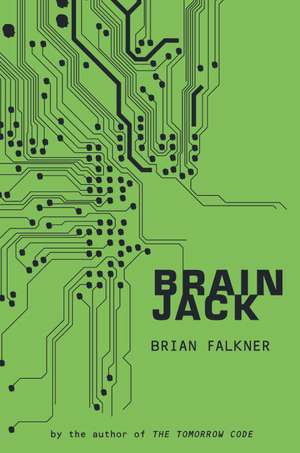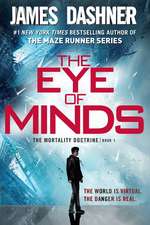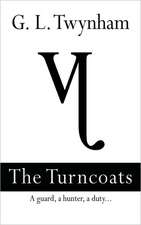Brain Jack
Autor Brian Falkneren Limba Engleză Paperback – 31 iul 2011 – vârsta de la 12 ani
In a dystopian near-future, neuro-headsets have replaced computer keyboards. Just slip on a headset, and it's the Internet at the speed of thought. For teen hacker Sam Wilson, a headset is a must. But as he masters the new technology, he has a terrifying realization. If anything on his computer is vulnerable to an attack, what happens when his mind is linked to the system? Could consciousness itself be hacked?
Brian Falkner, author of The Tomorrow Code and The Project, delivers an action-packed and thought-provoking sci-fi thriller in which logging on to a computer could mean the difference between life and death.
Preț: 85.38 lei
Nou
Puncte Express: 128
Preț estimativ în valută:
16.34€ • 17.74$ • 13.73£
16.34€ • 17.74$ • 13.73£
Carte disponibilă
Livrare economică 01-15 aprilie
Preluare comenzi: 021 569.72.76
Specificații
ISBN-13: 9780375843679
ISBN-10: 0375843671
Pagini: 347
Dimensiuni: 140 x 209 x 22 mm
Greutate: 0.31 kg
Editura: Ember
ISBN-10: 0375843671
Pagini: 347
Dimensiuni: 140 x 209 x 22 mm
Greutate: 0.31 kg
Editura: Ember
Notă biografică
BRIAN FALKNER has been surrounded by computers since childhood. His older brother built one out of spare parts, and Brian was programming it at a time when nobody could imagine the PC revolution that was to come. As computers developed, so did Brian's love affair with them. His first major in college was computer science.
In the real world, Brian lives in the beautiful country of New Zealand, in the South Pacific. In the cyberworld, you can find him at brianfalkner.com.
In the real world, Brian lives in the beautiful country of New Zealand, in the South Pacific. In the cyberworld, you can find him at brianfalkner.com.
Extras
1 | Dirty Tricks
On Friday, on his way to school, Sam Wilson brought the United States of America to its knees.
He didn’t mean to. He was actually just trying to score a new computer and some other cool stuff, and in any case, the words “to its knees” were the New York Times’, not his—and were way over the top, in Sam’s view. Not as bad, though, as the Washington Post’s. Their headline writers must have been on a coffee binge, because they screamed
National Disaster
in size-40 type when their presses finally came back online.
Anyway, it was only for a few days, and it really wasn’t a disaster at all. At least not compared to what was still to come.
A juddering roar reverberated off the high-rise buildings, and Sam glanced up as the dark shadow of a police Black Hawk slid across the street. His breath caught in his chest for a moment, as if all the oxygen in the street had suddenly disappeared, but the chopper didn’t slow; it was just a rou- tine patrol. It weaved smoothly between the monoliths of uptown Manhattan, a cop with a long rifle spotlighted in the open doorway by a brilliant orange burst of early- morning sun.
He tried to remember a time when armed police in helicopters hadn’t patrolled the city, but he couldn’t. It seemed that it had always been that way. At least since Vegas.
Gray clouds were leaking a dreary, misty drizzle from high over the city, but low on the horizon, there was a long thin gap into which the sun had risen, teasing New York with a short-lived promise of a sunny day.
Sam cut down 44th Street and turned right at 7th Avenue to avoid beggars’ row along Broadway. He took 42nd to Times Square, where the tall video screens flickered intermittently or were silent and dark. The M&M’s screen still worked, although there were several blank spots that were said to be bullet holes.
Forty-second Street station was crowded—jostling, bustling, shortness-of-breath crowded—at this time of the morning, but he was used to that, and the subway was still the fastest and safest way to get around Manhattan.
He got out at Franklin Street station and took Varick Street down to West Broadway. He quickened his step as he passed Gamer Alley. His nose wrinkled involuntarily at some of the odors that hung around the entrance.
Two dogs were fighting on the corner of Thomas and West Broadway but stopped as he approached. He slowed, not comfortable with the narrowing of their eyes or the jelly-strings of drool dripping from their fangs.
One took a step toward him, a low growl in its throat. The other followed, its lips drawing back from its teeth.
Sam took a step backward. The dogs moved closer, haunches high, stalking him. He stumbled backward a few more steps. A police Humvee cruised past, and he half turned toward it, hoping the cops would stop and intervene, but they either didn’t see or didn’t care.
The entrance to Gamer Alley appeared to his right. As the dogs spread out to cut off his escape, he turned and strode into the smoky unease of the alleyway.
He glanced behind but the dogs had not followed.
The walls of the alley were high, and the street was narrow, a deep saw-cut across a city block. None of the dawn glow penetrated, just a tired dullness that washed through the clouds and was swallowed up by the steam and smoke from the food stalls. Gaudy fluorescent signs appeared indistinctly through the haze, promising the latest in video-gaming technology. The games they promoted outside were innocuous, but everyone, especially the cops, knew that inside, the full range of games, including all the illegal ones, was freely available.
People drifted past. Both men and women with the vacant stares and twitching hands of longtime game addicts.
Sam thrust his hands into his jacket pockets, hunched his shoulders, and moved deeper into Gamer Alley.
A woman in her twenties, fashion-model beautiful, sat on a blue office chair next to an overflowing Dumpster. Her hair was plastered to her scalp by the rain, and droplets of water formed on the end of her nose before breaking away in a rhythmical pattern. She did nothing. She said nothing. She just sat, watching Sam as he made his way down the alley toward her. A game addict for sure.
As he neared, the chair swiveled slightly, and although her head and neck did not move, her eyes remained fixed on him.
He passed her, the chair swiveling more, her whole body turning with it to stay focused on him, her face expressionless.
His shoulders crawled as he left her behind, as if her strange inactivity might suddenly explode into mindless violence.
Ten yards past, he glanced back. She stared at him, unmoving.
“Want to buy a dog?”
The man in a shabby gray overcoat was right in front of him, and he had to stop abruptly to avoid a collision.
“I, er . . .”
“Want to buy a dog?”
The dog in question was in the man’s arms. A mangy cross about the size of a small poodle but of no detectable breed.
“He’s a good boy,” the man said, thrusting the dog forward. The dog snarled and snapped at Sam, missing his arm by a fraction of an inch.
“No, I . . .”
“Hardly ever bites,” the man said.
“No.”
Sam took a wide step around the man as the dog’s teeth snapped together again in midair.
The end of the alley neared.
To his right, a door opened on a second-story fire escape. A man in his fifties burst out of the building dressed only in Mickey Mouse boxer shorts and a Hawaiian lei around his neck. He was carrying a coffee machine. He leaped down the metal steps three at a time and disappeared across the street and around the corner of a building just as two policemen in black tactical gear burst out of the same door, hard on his heels.
Sam escaped onto Church Street with a slight sigh of relief and a relaxing of his nostrils. His cell rang, right on cue, as he turned into Thomas Street, and he tapped his Bluetooth earpiece into his ear.
“Hi, Mom,” he said.
“What kept you?” Fargas asked on the other end of the line, his mouth full of something.
Sam looked up at the building opposite. He caught a glimpse of Fargas behind a window on the second floor, the two black circles of a pair of powerful binoculars jutting out from his long mop of unruly hair. Sam made a discreet waving motion with his left hand.
There was a flash of white from the window that he took as a sign Fargas had waved back.
“Cut through Gamer Alley,” Sam said.
There was a short pause while Fargas digested that. “Quick hit on the way?”
“Just sightseeing,” Sam said. “What are you eating?”
It would be caramel corn. Fargas was the only person he knew who could eat caramel-coated popcorn for breakfast.
“Caramel corn,” Fargas said. “Want some? I’ll toss a couple pieces out the window.”
“Suddenly not hungry,” Sam said. “Can’t think why.”
He walked casually past the Telecomerica building as if he had no interest in it whatsoever. He didn’t even glance at it.
“You sure this is possible?” Fargas sounded a little nervous.
“I’m sure it’s not,” Sam said. “Be no fun otherwise. They’ve got industrial-strength firewalls with a DMZ and a secondary defensive ring with ASA and IPSec. Impenetrable.”
“Then give it away, dude,” Fargas said. “I’m not going to jail for the sake of a hack.”
“Fargas,” Sam said, “you’re my brother and I love you, but you gotta get your head out of your butt before you fart and suffocate yourself.”
“I’m not your brother and you don’t love me,” Fargas pointed out.
“You know you’re the one I’d turn gay for.” Sam grinned up at the window.
“I thought you liked Keisha,” Fargas said.
“I’d definitely turn gay for her,” Sam said. “If I was a chick. How is she?”
“Still not interested.”
“Her words or yours?”
“She’s a sophomore. You’re a senior. That’s just wrong. Should be illegal.”
“Have you asked her for me?” Sam asked.
“You can’t ask her yourself?”
“She’s a sophomore. I’m seventeen. That’s just wrong. She’s got to ask me.”
“Loser,” Fargas said.
Sam said, “Okay, here we go.”
From the Hardcover edition.
On Friday, on his way to school, Sam Wilson brought the United States of America to its knees.
He didn’t mean to. He was actually just trying to score a new computer and some other cool stuff, and in any case, the words “to its knees” were the New York Times’, not his—and were way over the top, in Sam’s view. Not as bad, though, as the Washington Post’s. Their headline writers must have been on a coffee binge, because they screamed
National Disaster
in size-40 type when their presses finally came back online.
Anyway, it was only for a few days, and it really wasn’t a disaster at all. At least not compared to what was still to come.
A juddering roar reverberated off the high-rise buildings, and Sam glanced up as the dark shadow of a police Black Hawk slid across the street. His breath caught in his chest for a moment, as if all the oxygen in the street had suddenly disappeared, but the chopper didn’t slow; it was just a rou- tine patrol. It weaved smoothly between the monoliths of uptown Manhattan, a cop with a long rifle spotlighted in the open doorway by a brilliant orange burst of early- morning sun.
He tried to remember a time when armed police in helicopters hadn’t patrolled the city, but he couldn’t. It seemed that it had always been that way. At least since Vegas.
Gray clouds were leaking a dreary, misty drizzle from high over the city, but low on the horizon, there was a long thin gap into which the sun had risen, teasing New York with a short-lived promise of a sunny day.
Sam cut down 44th Street and turned right at 7th Avenue to avoid beggars’ row along Broadway. He took 42nd to Times Square, where the tall video screens flickered intermittently or were silent and dark. The M&M’s screen still worked, although there were several blank spots that were said to be bullet holes.
Forty-second Street station was crowded—jostling, bustling, shortness-of-breath crowded—at this time of the morning, but he was used to that, and the subway was still the fastest and safest way to get around Manhattan.
He got out at Franklin Street station and took Varick Street down to West Broadway. He quickened his step as he passed Gamer Alley. His nose wrinkled involuntarily at some of the odors that hung around the entrance.
Two dogs were fighting on the corner of Thomas and West Broadway but stopped as he approached. He slowed, not comfortable with the narrowing of their eyes or the jelly-strings of drool dripping from their fangs.
One took a step toward him, a low growl in its throat. The other followed, its lips drawing back from its teeth.
Sam took a step backward. The dogs moved closer, haunches high, stalking him. He stumbled backward a few more steps. A police Humvee cruised past, and he half turned toward it, hoping the cops would stop and intervene, but they either didn’t see or didn’t care.
The entrance to Gamer Alley appeared to his right. As the dogs spread out to cut off his escape, he turned and strode into the smoky unease of the alleyway.
He glanced behind but the dogs had not followed.
The walls of the alley were high, and the street was narrow, a deep saw-cut across a city block. None of the dawn glow penetrated, just a tired dullness that washed through the clouds and was swallowed up by the steam and smoke from the food stalls. Gaudy fluorescent signs appeared indistinctly through the haze, promising the latest in video-gaming technology. The games they promoted outside were innocuous, but everyone, especially the cops, knew that inside, the full range of games, including all the illegal ones, was freely available.
People drifted past. Both men and women with the vacant stares and twitching hands of longtime game addicts.
Sam thrust his hands into his jacket pockets, hunched his shoulders, and moved deeper into Gamer Alley.
A woman in her twenties, fashion-model beautiful, sat on a blue office chair next to an overflowing Dumpster. Her hair was plastered to her scalp by the rain, and droplets of water formed on the end of her nose before breaking away in a rhythmical pattern. She did nothing. She said nothing. She just sat, watching Sam as he made his way down the alley toward her. A game addict for sure.
As he neared, the chair swiveled slightly, and although her head and neck did not move, her eyes remained fixed on him.
He passed her, the chair swiveling more, her whole body turning with it to stay focused on him, her face expressionless.
His shoulders crawled as he left her behind, as if her strange inactivity might suddenly explode into mindless violence.
Ten yards past, he glanced back. She stared at him, unmoving.
“Want to buy a dog?”
The man in a shabby gray overcoat was right in front of him, and he had to stop abruptly to avoid a collision.
“I, er . . .”
“Want to buy a dog?”
The dog in question was in the man’s arms. A mangy cross about the size of a small poodle but of no detectable breed.
“He’s a good boy,” the man said, thrusting the dog forward. The dog snarled and snapped at Sam, missing his arm by a fraction of an inch.
“No, I . . .”
“Hardly ever bites,” the man said.
“No.”
Sam took a wide step around the man as the dog’s teeth snapped together again in midair.
The end of the alley neared.
To his right, a door opened on a second-story fire escape. A man in his fifties burst out of the building dressed only in Mickey Mouse boxer shorts and a Hawaiian lei around his neck. He was carrying a coffee machine. He leaped down the metal steps three at a time and disappeared across the street and around the corner of a building just as two policemen in black tactical gear burst out of the same door, hard on his heels.
Sam escaped onto Church Street with a slight sigh of relief and a relaxing of his nostrils. His cell rang, right on cue, as he turned into Thomas Street, and he tapped his Bluetooth earpiece into his ear.
“Hi, Mom,” he said.
“What kept you?” Fargas asked on the other end of the line, his mouth full of something.
Sam looked up at the building opposite. He caught a glimpse of Fargas behind a window on the second floor, the two black circles of a pair of powerful binoculars jutting out from his long mop of unruly hair. Sam made a discreet waving motion with his left hand.
There was a flash of white from the window that he took as a sign Fargas had waved back.
“Cut through Gamer Alley,” Sam said.
There was a short pause while Fargas digested that. “Quick hit on the way?”
“Just sightseeing,” Sam said. “What are you eating?”
It would be caramel corn. Fargas was the only person he knew who could eat caramel-coated popcorn for breakfast.
“Caramel corn,” Fargas said. “Want some? I’ll toss a couple pieces out the window.”
“Suddenly not hungry,” Sam said. “Can’t think why.”
He walked casually past the Telecomerica building as if he had no interest in it whatsoever. He didn’t even glance at it.
“You sure this is possible?” Fargas sounded a little nervous.
“I’m sure it’s not,” Sam said. “Be no fun otherwise. They’ve got industrial-strength firewalls with a DMZ and a secondary defensive ring with ASA and IPSec. Impenetrable.”
“Then give it away, dude,” Fargas said. “I’m not going to jail for the sake of a hack.”
“Fargas,” Sam said, “you’re my brother and I love you, but you gotta get your head out of your butt before you fart and suffocate yourself.”
“I’m not your brother and you don’t love me,” Fargas pointed out.
“You know you’re the one I’d turn gay for.” Sam grinned up at the window.
“I thought you liked Keisha,” Fargas said.
“I’d definitely turn gay for her,” Sam said. “If I was a chick. How is she?”
“Still not interested.”
“Her words or yours?”
“She’s a sophomore. You’re a senior. That’s just wrong. Should be illegal.”
“Have you asked her for me?” Sam asked.
“You can’t ask her yourself?”
“She’s a sophomore. I’m seventeen. That’s just wrong. She’s got to ask me.”
“Loser,” Fargas said.
Sam said, “Okay, here we go.”
From the Hardcover edition.





